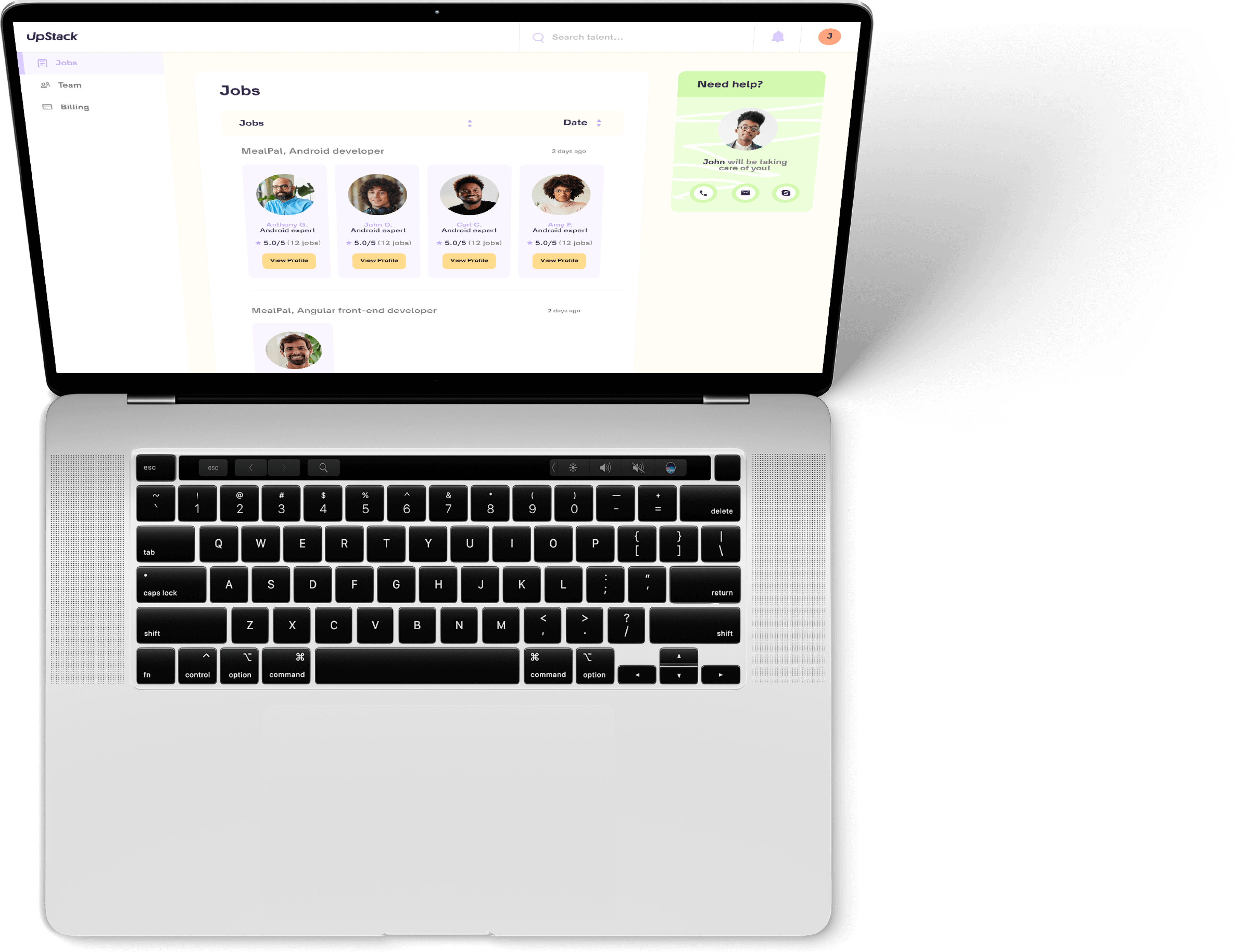


Hire Django Developers Remotely {Devs Ready!}
Stella B.
Available
Django Developer
-
Experienced Django engineer with seamless project implementation
-
Loves guacamole & hates spoilers

-
Marcus T.
Available
Django Engineer
-
Stacked portfolio of beautiful, functional websites
-
Known for his epic charcuterie & cheese boards

-
David M.
Available
Mobile Developer
-
Mobile engineering guru with a knack for translating stakeholder needs
-
Would rather be diving Palau’s Blue Corner

-
Top Django Developers with Upstack
Hire Django Developers with Upstack
When it comes to hiring a Django developer for your next project, it can be a daunting process. With the overwhelming number of developers on the market, it can be difficult to know where to start. However, this task doesn’t have to be so overwhelming. With the right tips and advice, you can make the process of finding a Django developer much easier. By understanding what to look for in a Django programmers, you can ensure you’re hiring the right person for the job. This article will provide expert tips and advice on what to look for when hiring a Django dev, from experience and skill level to communication style and personality. With these tips, you’ll be able to make an informed decision and find the best engineer for your team.
What to Look for in a Django Developer
Before you start the process of hiring a Django developer, it’s important to know what to look for in a developer. While each company and project is unique, there are a few key factors you should consider before hiring a developer. These factors include experience and skill level, communication style, and personality. Experience and skill level are important factors to consider when hiring a Django developer. The level of expertise in your team is vital for the success of your project. In order to make an informed decision, you need to understand what level of expertise is needed for your project. This will depend on a number of factors, including the type of project and the number of people on the team. Communication style is another important factor to consider when hiring a Django developer. A developer’s communication style is important in a team setting. This includes how they manage the team and how they communicate with the rest of the team members. Personality is another important factor to consider when hiring a Django programmers. Personality types can help to inform the rest of your team. Personality types are broken down into 16 different types. By considering personality types and hiring a developer with the right type, you can help to create a well-rounded team.
A. Technical Tests
You can start the hiring process by testing potential Django developers. This includes a written test and a technical test. A written test will help you understand how tech-savvy the developer is. This can help you determine if the developer is the right fit for the job. A technical test will provide you with insight into a developer’s skill level. Depending on the level of expertise you’re looking for in your developer, you can make the written and technical tests harder or easier. If you’re hiring a more junior developer, you may only want to test them on the basics. However, if you’re hiring a more senior developer, you may want to make the tests more difficult.
B. Interviews
After the written and technical tests, you can move on to interviews with potential Django programmers. You can either do one-on-one or group interviews, depending on the number of developers you’re hiring. By conducting interviews, you can get a better sense of how each developer works and how they fit into your team. You can also ask questions to learn more about each developer and their experience. This can help you determine which developers are the best fit for your team. During the interviews, you can ask questions about the developer’s experience. You can also ask questions about their past projects and what they’ve learned from them. This can help you gain insight into the developer’s work style and approach to projects.
C. Personality
Personality types play a big role in hiring developers. Personality types can help to inform the rest of your team. This is especially true in team settings where developers are working together closely. Having developers with different personality types can help to create a well-rounded team. This can help to cut down on potential conflicts and challenges related to team chemistry. By considering personality types and hiring a developer with the right type, you can create a well-rounded team. You can also consider personality types when creating job descriptions and putting together job boards. This can help you to attract the right developers for the job. By considering personality types, you can help to create a better team dynamic. Personality types are broken down into 16 different types. Knowing more about these types can help you determine which developer types are best suited for your team.
How to Vet Potential Django Programmers
Once you’ve found a few candidates from your hiring process, it’s time to vet the candidates. This will help you to determine the best candidates for the job. You can vet potential developers by conducting a technical test and an interview. A technical test will help you to understand how skilled each candidate is. For example, you can test candidates on their knowledge of the Django framework. This will help you to determine which candidates are most qualified for the job. An interview with each candidate will also help you to vet potential programmers. During the interview, you can ask candidates about their experience and approach to projects. You can also ask candidates about their skill level and if they’re a good fit for your team. This will help you to determine which candidates are the best fit for the job.
They trust Our Django Developers
Why hire a Django developer with Upstack
![Django Developer and Programmer]()
Top Django talent pre-vetted for a perfect fit.
Our 8-point assessment evaluation ensures that every senior Django developer you interview exceeds expectations across technical, cultural, and language criteria.
![Django Programmers Computer Icon]()
Hire reliable, passionate Django developers.
From late-night sprints to jumping on a last-minute face-to-face, we ensure that your recruits are down to get the job done right.
![Django Programmers High Five Icon]()
Risk-free 14-day trial.
Confidently onboard candidates with our no-questions-asked trial period. We’ll walk you through the contract-to-hire process if and when you’re ready to make it permanent with your new Django engineer.
![Django Computer Programmer Icon]()
Our Client Success Experts provide white-glove service.
Stay laser-focused on your business goals while our team of experts curates potential candidates and manages seamless programmer onboarding.
![Django Developer Writing Notes Icon]()
Build your optimal team confidently, quickly.
UpStack handles everything including background and reference checks, legal issues, and more. Our platform streamlines billing, timesheets, and payment all in one easy-to-access place.
Schedule a call with a Client Success Expert to get starting hiring a Django developer.
Start hiring Start hiring Start hiring
Hire from the Best.
Working with our Client Success Experts, we’ll help you build the remote team of your dreams with top Django talent from around the world.
Pre-vetted, reliable Django developers are standing by.





Hiring Django Developers | FAQs
How much does it cost to hire a Django developer?
UpStack has a simple billing model where each Django developer has a standard hourly rate averaging between $65-$75 per hour. Rates are based on skills, knowledge, and experience, and our developers are available mainly for full-time engagement (40 hours per week) and the occasional part-time opportunity (20 hours per week).
What is the process to find a Django developer?
You’ll connect with an UpStack Client Success Manager to determine your immediate needs. Our team uses a combination of AI and personal assessment to short-list candidates that match your job requirements. From there, you interview, select, and onboard the perfect developer, all within days of your initial call.
How does UpStack find its Django developers?
UpStack’s talent recruitment team connects with software developers around the globe every day. Each Django programmer is vetted for technical, communication, and other soft skills necessary for a developer to successfully work with your team. Once vetted, the candidates are accepted into the UpStack developer community.
How is UpStack different from an agency or recruiter?
UpStack's community of available, pre-vetted engineering talent means minimizing roadblocks to scaling your team effectively, efficiently, and immediately. Our Client Success Experts work with you and your UpStack developer to ensure a smooth and seamless engagement.
Can I hire UpStack Django developers directly?
Yes, you can hire UpStack Django developers at any time, and with the same assurance of smoothly on boarding talent risk-free. First, we’d create a job opening on our portal. Then, we’d vet, interview, and match developers that meet your needs. If you’re satisfied at the end of the 14-day trial period, at any time you can directly hire them.
FAQs from Django Developers and End Users
What is Django?
Django is a free and open-source web framework written in Python. It is a high-level framework that is designed to make the development of web applications easier by providing a basic structure for managing database access, file uploads, and other common tasks that are required to build a modern web application. Django is often used in conjunction with other popular Python libraries such as NumPy, Pandas, and Matplotlib to provide a powerful and flexible backend for web applications.
Is django used for app development?
Yes, Django can be used for developing mobile apps, although it is more commonly used for developing web applications. Django is a powerful framework that provides all the tools and libraries you need to create a web application, including a user authentication system, an object-relational mapper (ORM) for managing database access, and support for common web protocols such as HTTP and HTTPS. With Django, you can create the backend for your mobile app, which typically includes the server-side logic, the database, and the APIs that your app will use to communicate with the backend.
Are django developers fullstack?
Django is a web framework that is typically used for creating the backend of a web application, which means that Django developers often have a focus on the server-side of web development. However, this does not necessarily mean that Django developers are not full-stack developers.
A full-stack developer is a software developer who has experience and expertise in all layers of a web application, from the front-end user interface to the back-end database and server-side logic. This typically includes experience with both client-side technologies such as HTML, CSS, and JavaScript, as well as server-side technologies such as Django, Ruby on Rails, or ASP.NET.
So, while some Django developers may have a focus on the backend and may not have as much experience with front-end technologies, it is possible for a Django developer to be a full-stack developer if they have experience and expertise in both the front-end and the back-end of web development.
Can you run django development server on heroku?
Yes, you can run the Django development server on Heroku, a cloud platform-as-a-service (PaaS) that provides a runtime environment for applications written in many different languages, including Python.
To run the Django development server on Heroku, you will need to create a new Heroku app and then deploy your Django code to the app using the Git version control system. Once your code is deployed, you can start the Django development server by running the heroku local web command in your terminal. This will start the Django development server on your local machine and make it accessible at the local host URL that is specified in the Procfile of your Heroku app.
Alternatively, you can also use Heroku's built-in support for running Django applications to automatically start the Django development server when you deploy your code. This is done by including a wsgi.py file in your Django project that Heroku can use to start the development server when it receives an incoming web request. For more information on how to do this, you can refer to the Heroku documentation for Python.
How can I mitigate cross-site scripting in django?
Cross-site scripting (XSS) is a type of security vulnerability that allows an attacker to inject malicious code into a web page, which is then executed by the victim's web browser. This can allow the attacker to steal sensitive information, such as the victim's login credentials, or to perform other malicious actions on the victim's behalf.
To mitigate the risk of XSS vulnerabilities in a Django application, there are several best practices that you can follow:
- 1. Use Django's built-in cross-site scripting protection middleware, which automatically escapes potentially dangerous characters in user-generated input, such as the < and > characters that are commonly used in HTML tags. This middleware is enabled by default in Django, but you can also customize it to suit your specific needs.
- 2. Use the mark_safe() function from Django's utils.safestring module to mark user-generated input as safe for rendering in a template. This tells Django to not escape the characters in the input, allowing you to safely include user-generated content in your templates without risking an XSS vulnerability.
- 3. Use the {% autoescape %} template tag to enable automatic escaping of user-generated input in your templates. This allows you to define specific blocks of your templates where user-generated input is automatically escaped, while still allowing you to include user-generated content in other parts of your templates using the mark_safe() function.
- 4. Validate and sanitize user-generated input to ensure that it does not contain any potentially dangerous characters or HTML tags. You can do this using Django's built-in form validation and sanitization functions, such as the validate_email() and strip_tags() functions, or by using third-party libraries that provide additional tools for validating and sanitizing user input.
By following these best practices, you can help to prevent XSS vulnerabilities in your Django application and protect your users from potential security threats.















